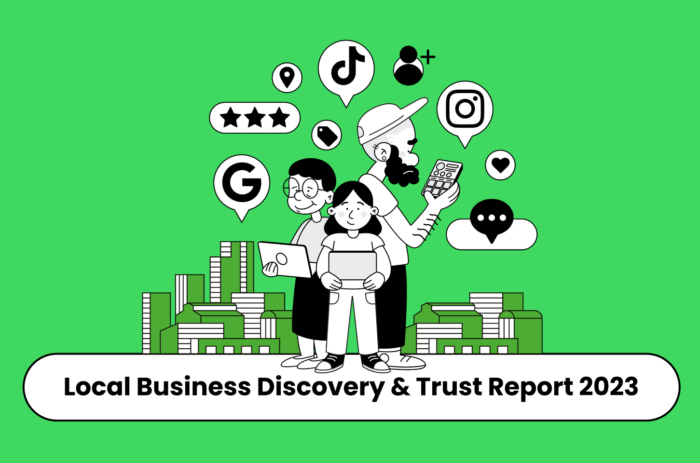- The top three most trusted platforms for researching local businesses are Google (66%), Google Maps (45%), and a business’s own website (36%).
- 62% of consumers would avoid using a business if they found incorrect information online.
- Seeing mostly negative written reviews would cause 63% of consumers to lose trust in a business.
- 7% of consumers would abandon their search for a business entirely if they found incorrect address details, compared to 3% in 2021.
- 23% of consumers are coming across fake business listings at least once a month.
- Facebook is the most-used and least-trusted social channel for business discovery.
- Business photos taken by customers are seen as particularly important decision-making factors for hotel (32%), food and drink (29%), and beauty and wellbeing (26%) industries.
It’s fair to say that, in 2023, a managed digital presence is an absolute must for businesses. Without this, a business is severely missing out on opportunities to build trust, boost visibility, and stay relevant in its audience’s mind.
Within the local SEO space, there’s plenty of discussion about the importance of business citations for local rankings. And, while this is a core local marketing tactic, it’s vital to consider the people that business information matters to the most: its customers.
In 2021, we released the Business Listings Trust Report, highlighting how consumers interact with business listings to discover and use local businesses.
While the Local Business Discovery and Trust Report 2023 is very much a continuation of this research, we felt that the way consumers discover businesses or look for information about them today has come on leaps and bounds, with social channels doubling as business listings, and the continued power of visuals such as video content or customer photos.
So, how are consumers looking for local businesses online today and how are they discovering new businesses? We asked over 1,000 people what they thought. Let’s get to it.
What do we mean by business listings and business information sites?
Business listings—or business citations as they’re more commonly known by local SEOs—are listings of a business’s information online, typically their name, address, and phone number (NAP) at the very least. These can be ‘structured’, as seen on directories like Yell or BBB, or ‘unstructured’, which you may come across via a local news publication or blog.
When we refer to ‘business information sites’, this is a more general term including any website, app, or platform that holds information about businesses consumers are searching for. These might be search engines, like Google and Bing, industry-specific review sites such as TrustPilot, directories, or business profiles on social media.
Where are consumers finding business information online?
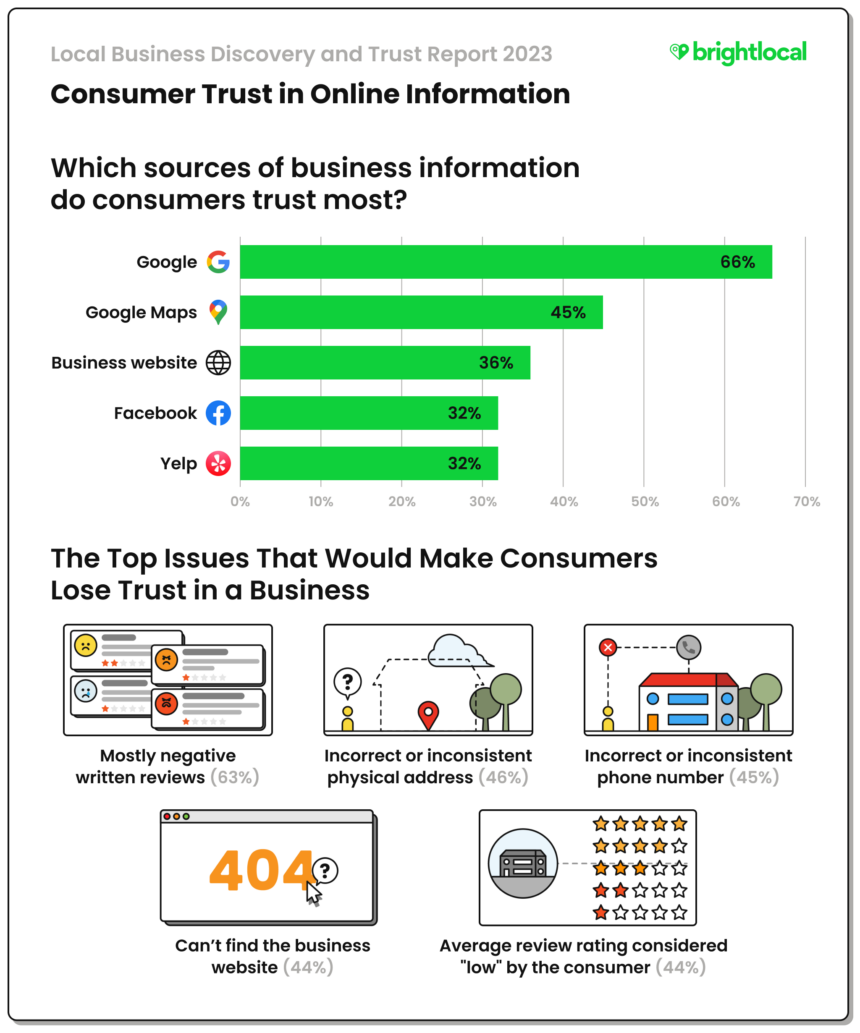
In the 2021 Business Listings Trust Report, we asked consumers which platforms they used to find information about local businesses. This time around, we asked which platforms consumers trust to find information about local businesses.
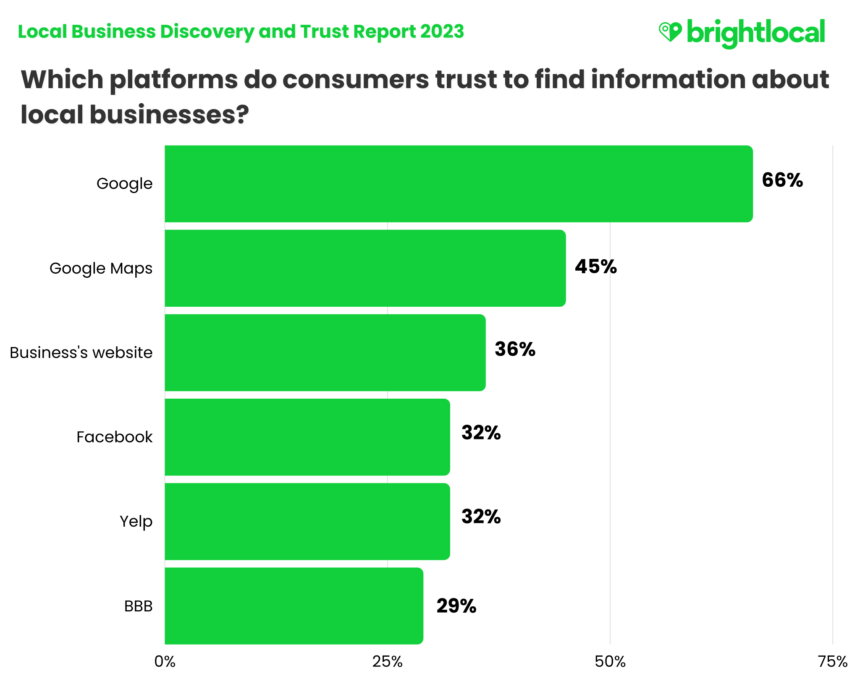
- The top three most trusted websites or platforms consumers use for researching local businesses are Google (66%), Google Maps (45%), and a business’s own website (36%).
It likely won’t surprise anyone that Google comes out on top as the most trusted platform or website that consumers use to research local businesses. As of July 2023, Google’s worldwide market share as a search engine was 83.49%.
A Note on Google Products and Device Preferences
Google Maps has come out as the second most trusted platform, with 45% of consumers saying they use it to find information about local businesses.
Although it makes sense that consumers would trust another prominent Google product, it’s significant to note that 49% of consumers told us they prefer to search for business information using Apple devices (37% iPhone and 12% MacOS laptops or desktops).
Of these users, 59% named Google Maps as their preferred maps app for business research and discovery.
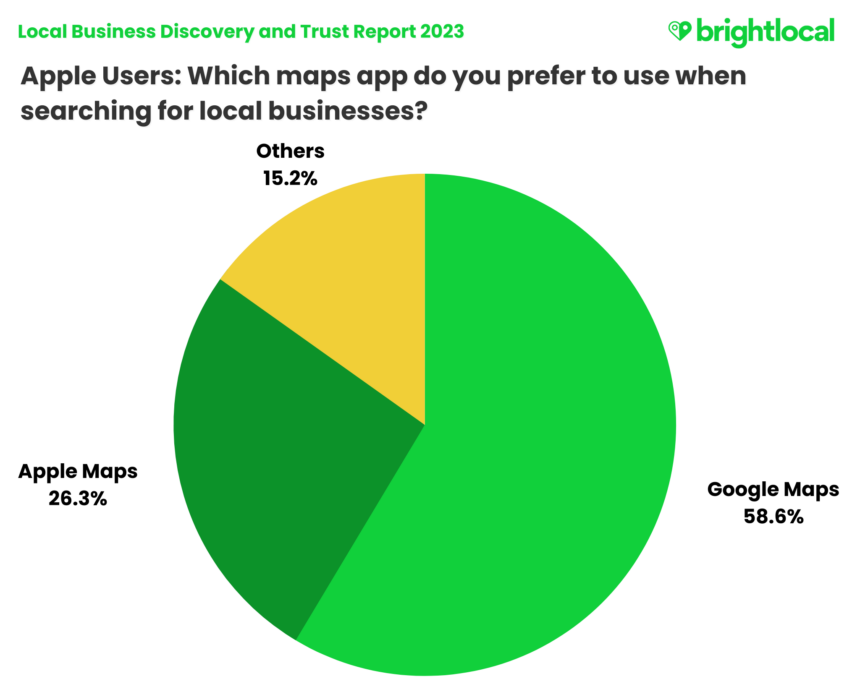
A business’s own website is the third most trusted method of finding business information (36%), which suggests that consumers are more likely to trust what Google is telling them—which is interesting, as business information on things like Google Business Profile could well be provided by the business itself, perhaps unknown to the consumer.
However, clicking straight through to a business’s website also suggests that consumers have a high level of intent, in that they may be looking for more detail about specific products or services and trust that a website is the best place for that information.
Facebook sits as the joint fourth most trusted platform for finding information about businesses online, alongside Yelp. Interestingly, the social media platform is so high up the list for business research, considering this year’s Local Consumer Review Survey found that Facebook usage for business research had fallen year-on-year and that a significant percentage were also wary of fake reviews on the platform. In addition, we highlighted dwindling usage stats for Facebook among US adults.
That being said, Facebook listings are prevalent among both search giants Google and Bing, with Bing often pulling the platform’s reviews through to local pack-style cards that highlight key business information.
In what circumstances are consumers looking for businesses online?
When considering why consumers are looking for local business information online, we provided a new option this year to consider proximity.
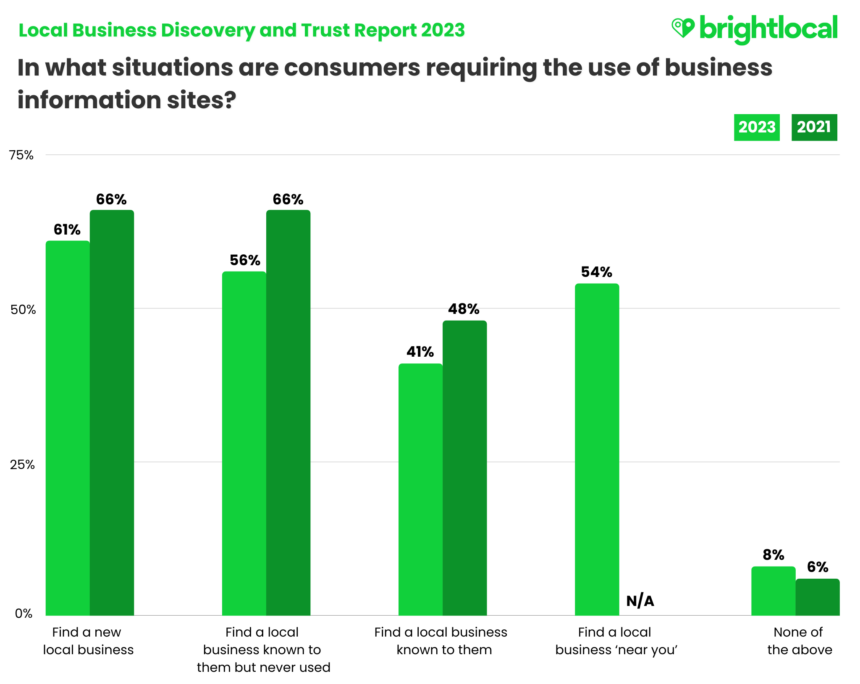
- The percentage of consumers using business information sites to discover new local businesses has decreased from 66% in 2021 to 61% in 2023.
- The percentage of consumers using business information sites to find businesses they are aware of, but have never used, dropped from 66% in 2021 to 56% in 2023.
- The percentage of consumers using business information sites to find information about known businesses has decreased from 48% in 2021 to 41% in 2023.
Of the three options presented to consumers in both 2021 and 2023, we can see that percentages have decreased across the board.
It’s interesting as there doesn’t appear to be a clear reason. It could be the case that consumers are considering more varied sources when researching businesses online, as opposed to what they might consider ‘typical’ business information sites—later on, we’ll discuss the prevalence of social media for business discovery in more detail, including channels focusing on user-generated content like YouTube.
The Consequences of Incorrect Business Information
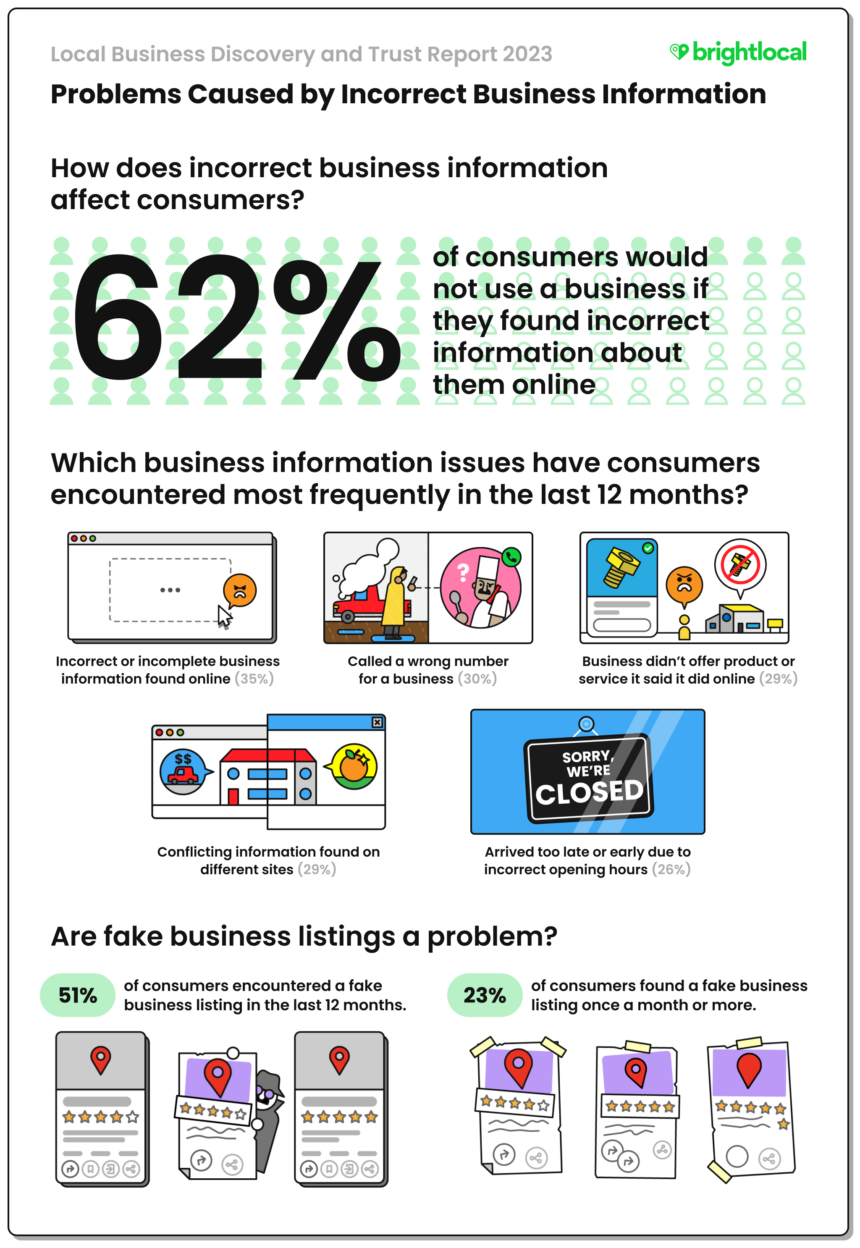
When looking up business information like its address, opening hours, and product inventory, the availability of this information is vital to help consumers make a decision. So, what happens when this goes wrong?
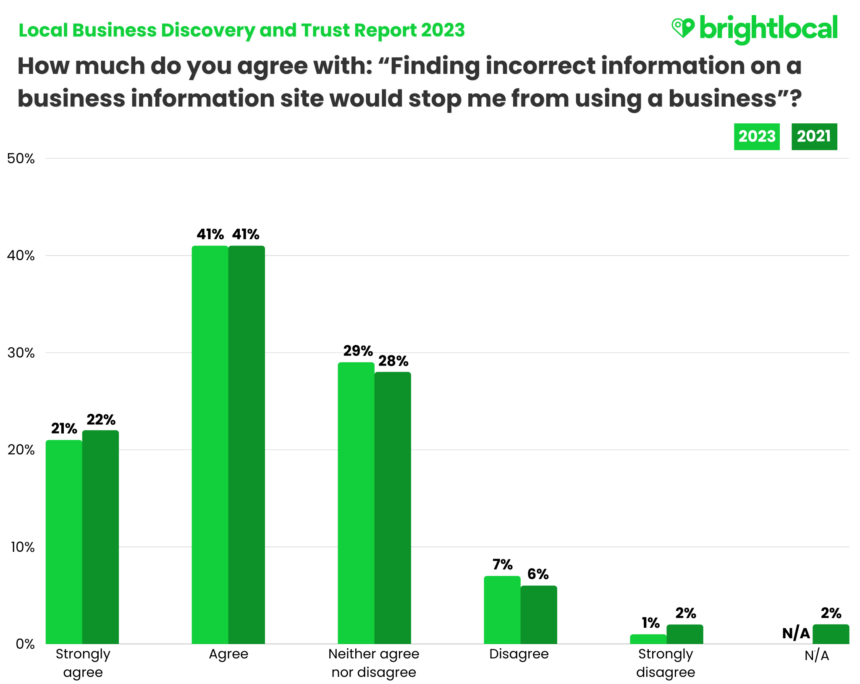
- 62% of consumers would avoid using a business if they found incorrect information online in 2023, compared to 63% in 2021.
You’ll see in the chart above that the percentages remain fairly static in 2023, which highlights the continued importance of maintaining correct business information across different listings.
A huge 62% of consumers would be turned away from using a business if they found incorrect information online, which means that only just over a third of consumers would be willing to give your business the benefit of the doubt if inaccuracies are found!
For something that could be as small as a typo in a business address, email address, or phone number, it risks losing prospective customers to competitors and potentially even damaging your business reputation.
The Smarter Way to Manage Listings
Discover a cutting-edge solution for effective listings management
What actions do consumers take upon encountering incorrect information?
Although we know that incorrect business information is enough to stop 62% of consumers from using a business, we asked them what their first reaction would be to finding an incorrect address online.
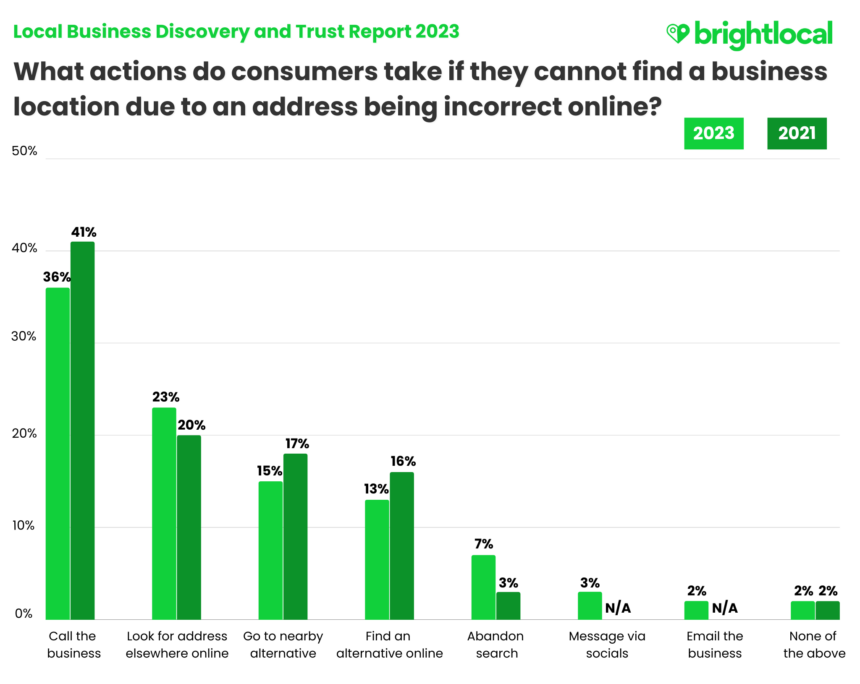
- 36% of consumers would call the business to confirm the correct address, as opposed to 41% in 2021.
- 28% of consumers would seek an alternative business to meet their needs, a decrease from 33% in 2021.
- 7% of consumers would abandon their search there and then, compared to 3% in 2021.
The percentage of consumers willing to call a business has decreased from 41% in 2021 to 36% in 2023, but we can see that this has been distributed across the new options of messaging the business via their socials or sending an email. It may be that, as more and more local businesses have an active social media presence, consumers see it as an easier option to reach out this way.
On the whole, it appears that if a customer has already decided to visit your business address, they won’t abandon hope at the first hurdle. 65% of consumers said they would take action, either by contacting the business directly or researching elsewhere to confirm the details.
It’s reassuring to know that the majority of consumers are willing to give businesses another chance, but this should still be seen as a warning sign to check your company details and contact information anywhere that it is listed!
Incorrect Business Information Can Cause Consumers to Lose Trust
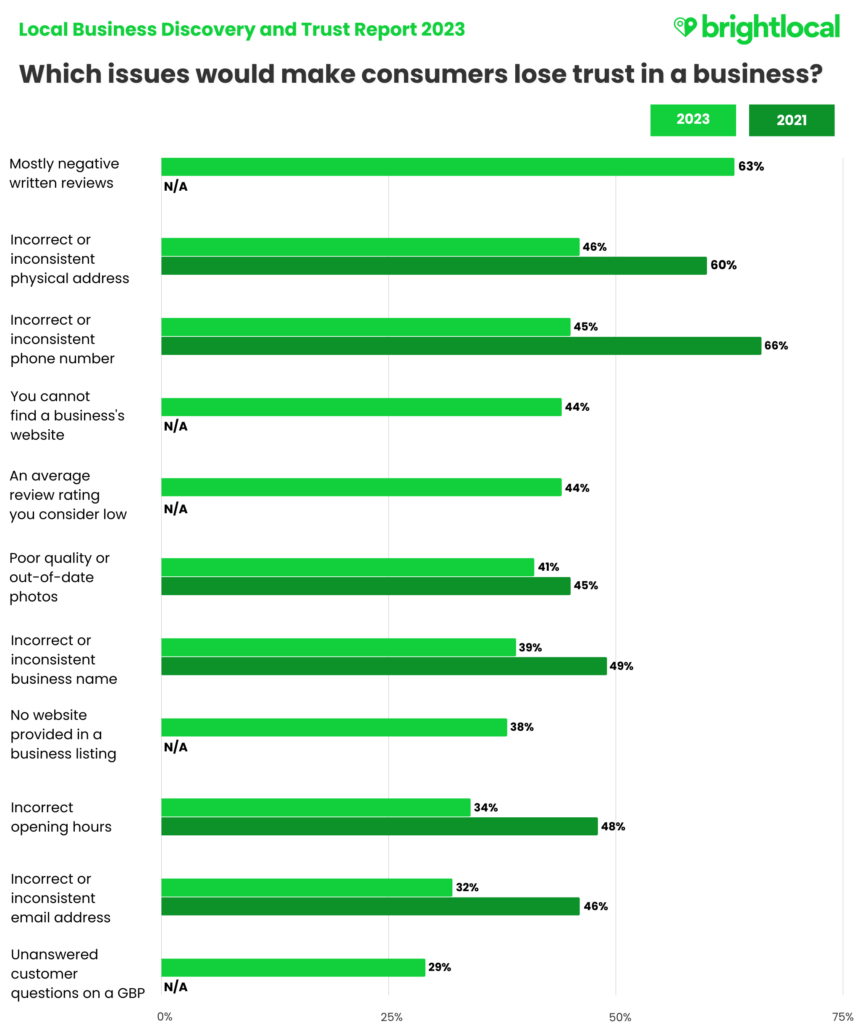
- 63% of consumers said seeing mostly negative written reviews would make them lose trust in a business.
- The percentage of consumers who would lose trust in a business after seeing an incorrect address decreased from 60% in 2021 to 46% in 2023.
- The percentage of consumers who would lose trust in a business after encountering an incorrect phone number decreased from 66% in 2021 to 45% in 2023.
It’s important to consider that many business information sites also double as review platforms, or pull in reviews from other sites. When asking consumers about the issues that would make them lose trust in a business, we added considerations around negative reviews, both in terms of written content and review ratings. “Mostly negative written reviews” was the top issue that consumers said would make them mistrustful of a local business, with 66% of consumers highlighting this.
This is a particularly interesting finding and comes hot off the back of some research Near Media has recently completed around searcher behavior. At our recent Local SEO For Good conference, Near Media’s David Mihm, Greg Sterling, and Mike Blumenthal presented some fascinating findings that showed only about 33% of users were actually reading reviews.
They found that users are taking the time to seek out review content and scrolling SERPs to find better-reviewed businesses. Perhaps this suggests that, although they might not be reading them properly, consumers are skim-reading reviews to look for red flags and common themes.
Meanwhile, our findings show that 44% of consumers would lose trust in a business if they saw what they would consider a “low” average review rating. But what’s considered “low”? Well, our Local Consumer Review Survey this year found that 87% of consumers would not consider a business with an average rating below 3 stars, so that feels like a good indicator.
Our findings and the findings from Near Media show that, even if there are platforms where you do not focus on your business’s reputation, the information consumers find can be powerful enough to turn them away.
The Importance of Monitoring Your Business Review Profiles
We’d always recommend trying to diversify your reputation management to cover multiple platforms. Find out how you can monitor your review performance and manage review campaigns all in one place with BrightLocal.
It’s interesting to see that consumers appear to be more lenient towards the issues we first presented in 2021. The percentage of consumers saying that they would lose trust in a business after spotting inaccurate information such as physical address, contact number, opening hours, and email address, has all decreased since the 2021 report.
The most significant difference is in the results for encountering incorrect phone numbers. In 2021, 66% of consumers said this would make them lose trust in a business, compared to 45% in 2023. Although this still takes a stop in the top three issues that cause consumers to lose trust, it reflects a shift in consumer behavior as to how they prefer to interact with businesses (as a self-confessed phone-avoiding millennial, I can relate).
What business information is most important to consumers?
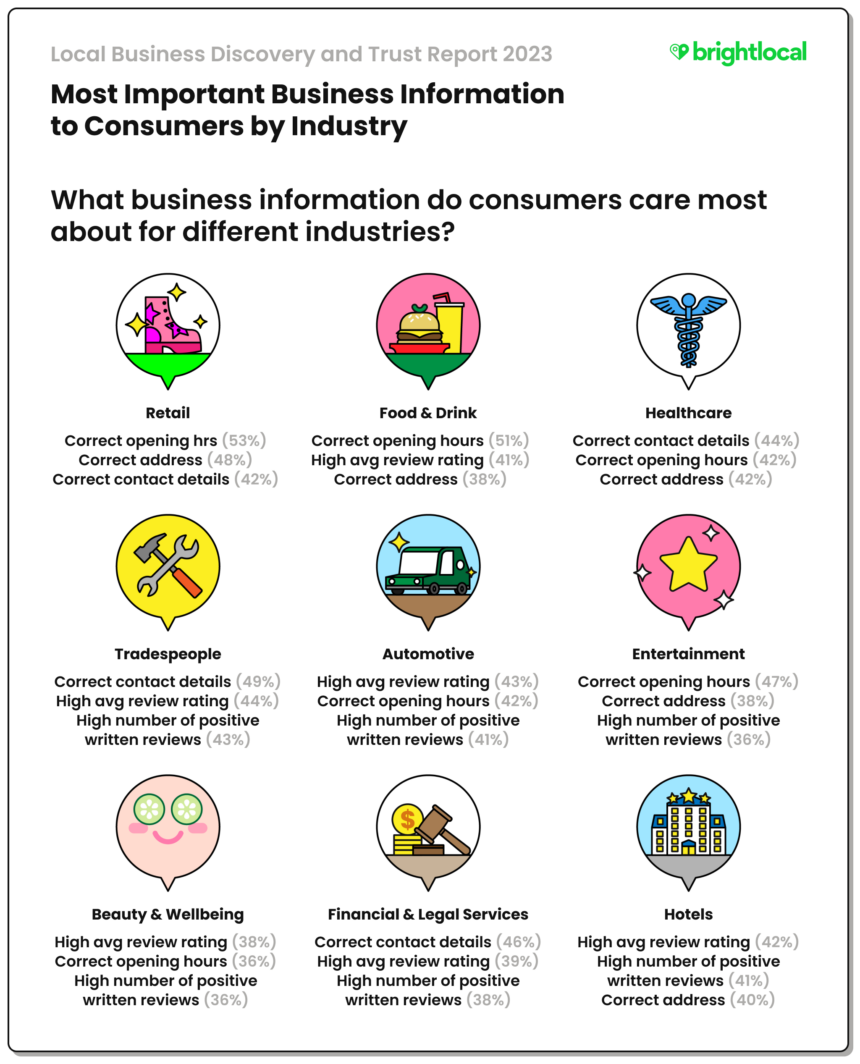
Does the importance of different types of business information vary by industry?
Although it appears consumers are now feeling a bit more forgiving of businesses when it comes to issues with business information, we did have to wonder how this would vary for businesses in different industries: would you be more forgiving of a retail outlet for a low average review rating, compared to a medical clinic, for example?
N.b. In this section, we’ve chosen to display the results in two separate charts, grouping industries based on the type of consumer need (first, entertainment and pleasure, then emergency and professional services).
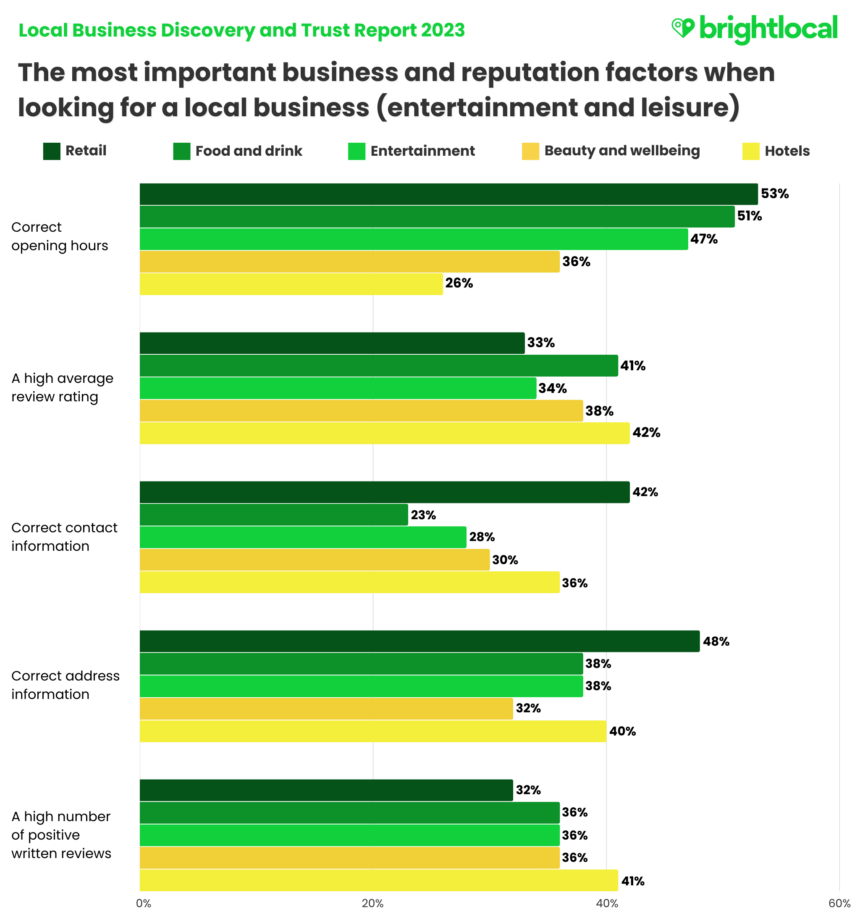
- Consumers view correct opening hours as most important for retail businesses (53%), food and drink businesses (51%), and entertainment businesses (47%).
- Correct address information is the second most important factor for retail businesses (48%).
- High average review ratings are seen as more important for hospitality-focused businesses: hotels (42%) and food and drink (41%).
For retail businesses, consumers need to know the most basic—yet most vital—business information: its opening hours (53%), where it is (48%), and how to get in touch (42%). It’s likely that, if a consumer is searching for a particular type of local retailer online, they already have a purchase in mind and are looking to get to that location soon.
Reputation elements appear to be less important to consumers here. This is likely because the quality of the product they’re looking to buy is often not connected to the quality of the service experience.
However, for businesses in which the service experience is the product, for example in hospitality and entertainment, review ratings and the number of positive written reviews are shown to be more important to consumers.
42% of consumers said that a high average review rating was important to them when considering hotels, followed by 41% for food and drink businesses. Similarly, 41% of consumers highlighted that a high number of positive written reviews was most important to them when looking for information about hotels.
While retailers should still view reputation management as important for building trust with potential customers, if a potential customer has a purchase in mind, then the likelihood of them visiting the store regardless of review ratings will remain fairly high.
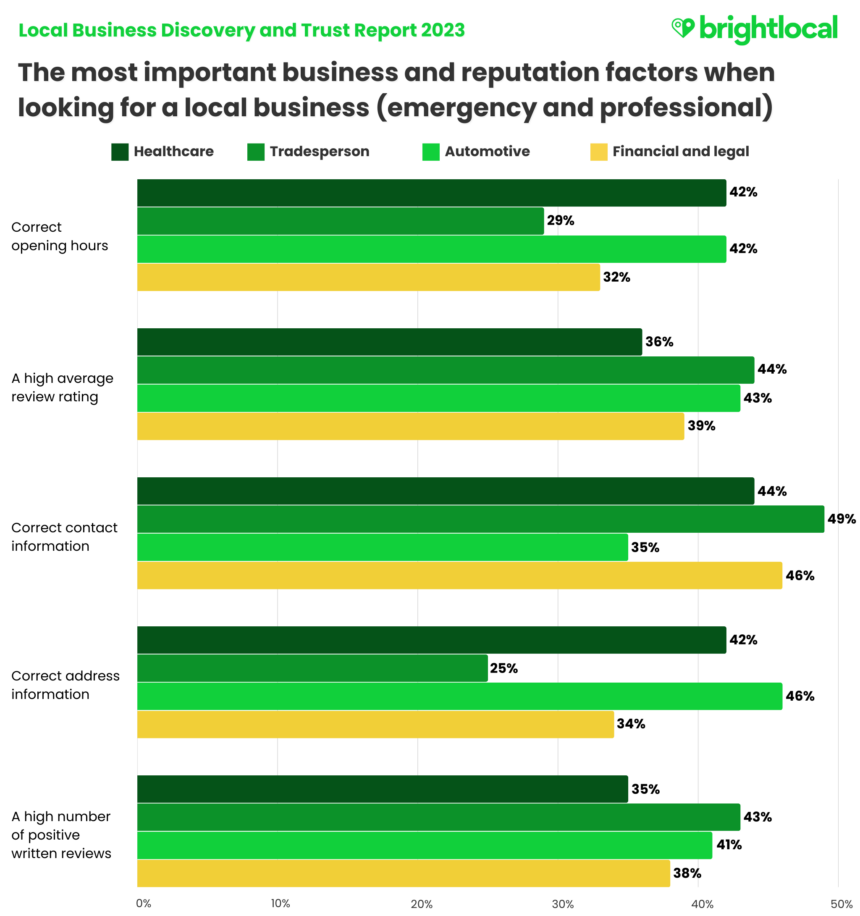
- 49% of consumers said correct contact information is most important for tradespeople and service area businesses (SABs).
- Knowing the correct physical address is more important to consumers when looking for automotive businesses (46%) and healthcare businesses (42%).
Arguably, the requirement for businesses in the industries listed above sits much more in the realm of necessity and, in some cases, even urgency, compared to those in hospitality, entertainment, and retail. Therefore, we can see that consumers are placing a high level of importance on fundamental business information, like accessing the correct contact information and the correct address.
Being able to find correct contact information is most important to consumers when looking for tradespeople (49%), financial and legal services (46%), and healthcare businesses (44%), suggesting that, when these types of businesses are required, that need is for now.
Out of these industries, consumers think it’s important that tradespeople and SABs are reputable, with two of the top most important factors being a high average review rating (44%) and a high number of positive reviews (43%).
Again, as these types of businesses are often required in a more immediate sense, it follows that consumers expect to see evidence of their reliability. Plus, if you’re inviting a professional into your home for something like a plumbing or electricity emergency, the customer wants to be assured that they are respectful, trustworthy individuals.
How often are consumers encountering issues with business information?
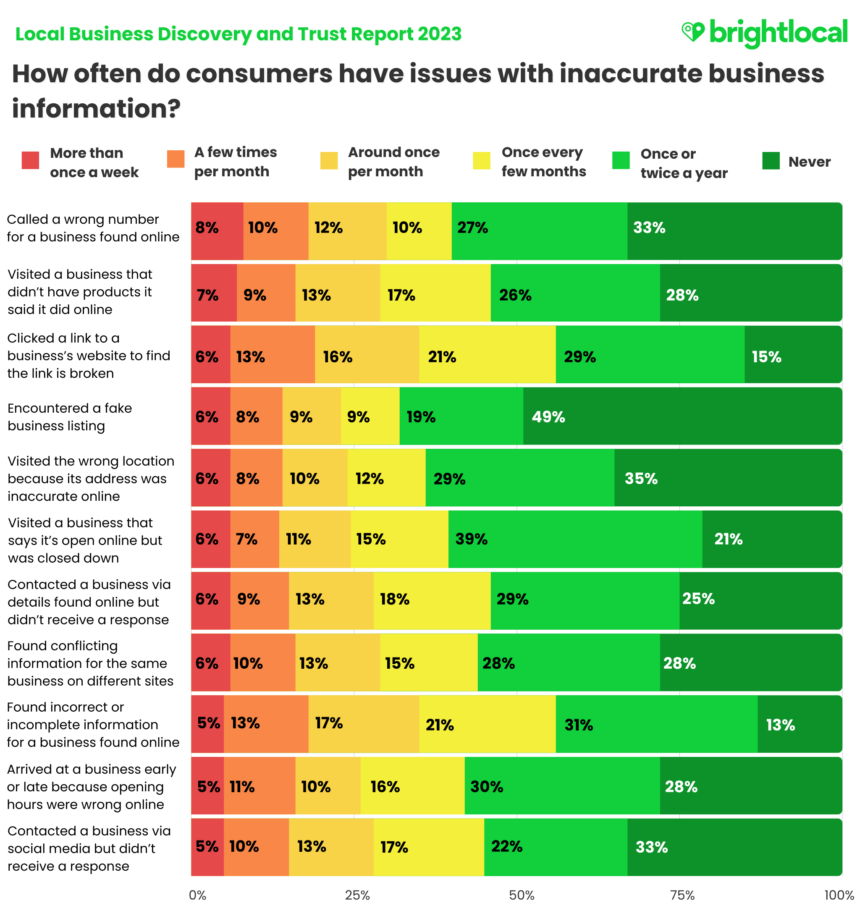
- 56% of consumers are encountering incorrect business information online at least once every few months.
- 23% of consumers are coming across fake business listings at least once a month.
- 28% of consumers are contacting businesses on social media and not receiving a response at least once a month.
- 8% of consumers are calling the incorrect number for a business at least once a week.
Just 13% of consumers say they have never encountered incorrect business information of some sort online, while 35% of consumers are encountering it on at least a monthly basis.
As we know from earlier, 35% of consumers would either find an alternative local business or abandon their search entirely as a result of incorrect information, so that’s a lot of business regularly lost.
And, for those businesses where customers have arrived to find them closed (or not even there!), this oversight in business information will likely be funneling their would-be customers directly to a nearby competitor.
26% of consumers are visiting businesses too early or late due to incorrect opening hours on at least a monthly basis, so you can imagine that if it was for something as convenient as coffee and groceries, or as urgent as car repair, they’re going to go elsewhere instead of waiting for you to open.
Worryingly, more than half of consumers are spotting fake business listings throughout the year—with 23% of consumers coming across them at least once a month! There are several reasons that fake business listings might exist online (such as spam or fraudulent intentions), but in some cases, legitimate businesses may be creating spammy listings in an attempt to outrank their competitors, causing confusion and turning customers off in the process.
The bottom line is that encountering spam or fake listings is incredibly frustrating for consumers in need of a particular product or service, and is also harmful to local businesses in that industry.
Combating Fake Business Listings
Google is particularly stringent when it comes to detecting and removing fake business listings, using a combination of machine learning and human verification teams to remove fake or spam listings, reviews photos, and videos.
You can report fake Google and Bing business profiles by clicking on ‘Suggest an edit’ on the listing itself. Other listing platforms tend to use similar processes, such as ‘Improve this listing’ on Tripadvisor and ‘File a complaint’ on Better Business Bureau (BBB).
Luckily, it seems consumers are also pretty switched on when it comes to suggesting edits to business information. We found that almost half of consumers have suggested edits to business profiles where information is incorrect.
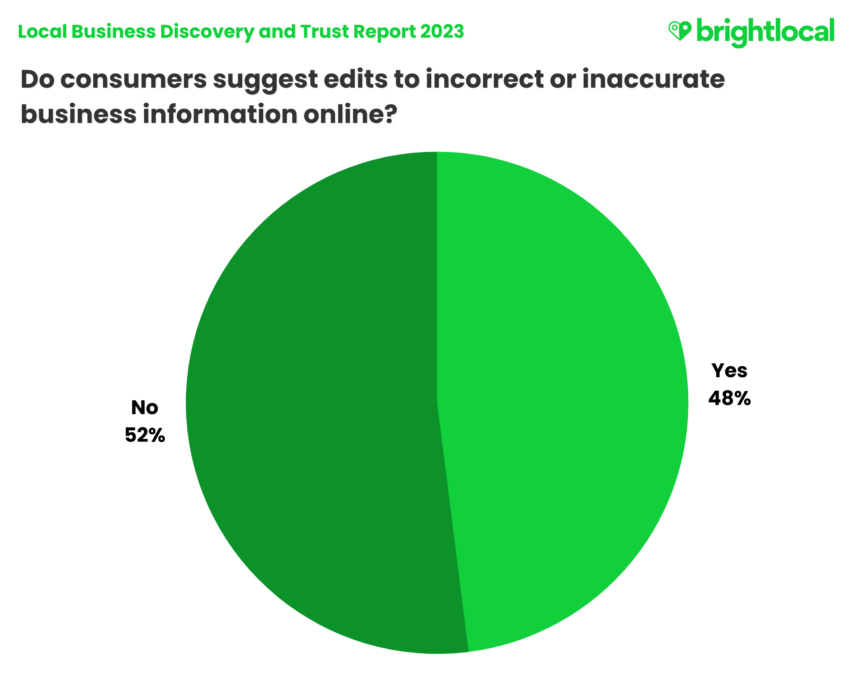
How often are consumers searching for and using different types of local business information?
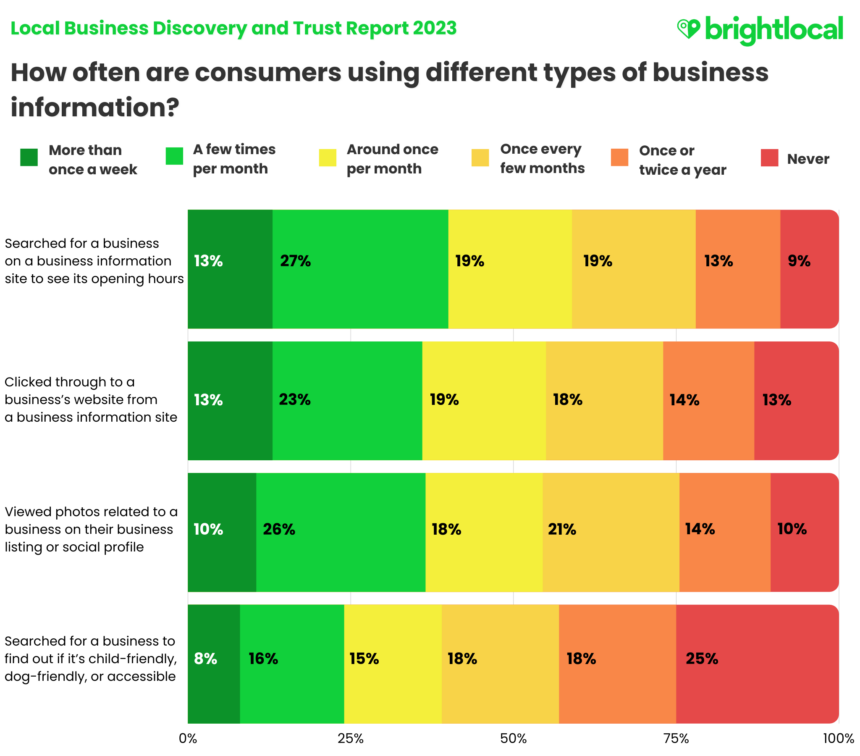
- 40% of consumers search for business opening hours several times a month.
- 36% of consumers are clicking through to websites from URLs found on business information sites several times a month.
- 39% of consumers are searching for business information, such as whether a business is child or dog-friendly, every month.
We also sought to understand the frequency of search behavior for particular business information. This can help to highlight where there may be gaps in your own business information.
For example, 39% of consumers said they are searching for business attributes such as being child or dog-friendly, or wheelchair accessible, on at least a monthly basis.
This means that if you aren’t calling out this information on your business listings, then you may well be losing out to competitors. Consider where you can make this information prominent across your listings: for example, Google Business Profile (GBP) allows you to add specific attributes to your listing that call out things like ‘dog-friendly’ and ‘LGBT-owned’, while you could also consider adding Q&As to your GBP to make it really clear.
Meanwhile, if you aren’t consistently updating changes to your opening hours across listings, or checking the correct URL is being used for your site, that’s a huge amount of people potentially being turned away.
The Role of Social Media in Online Business Discovery
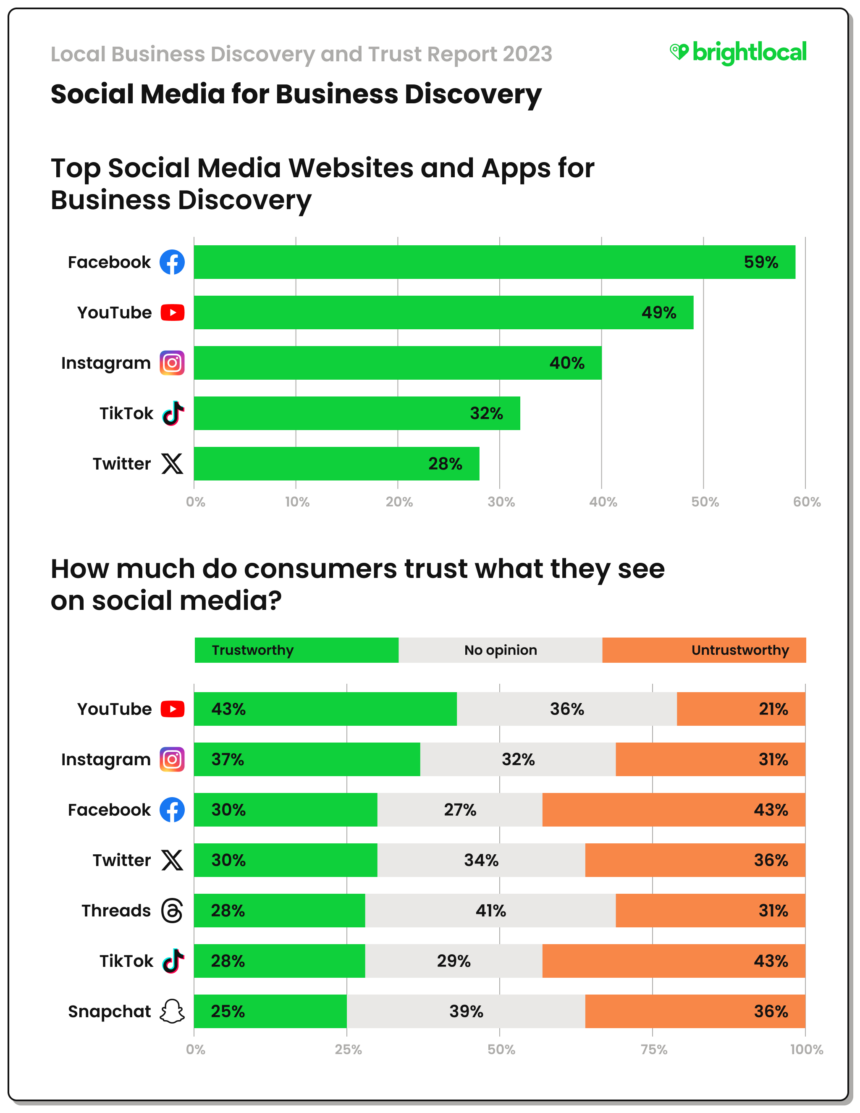
Social media plays a huge role in the discovery of, and interaction with, local businesses. With so many platforms available to create an official business profile, and of course, many consumers taking to the platforms as the first port of call to rave—or rant—about experiences with brands, it makes sense that this is the case.
What social platforms do consumers trust for business discovery?
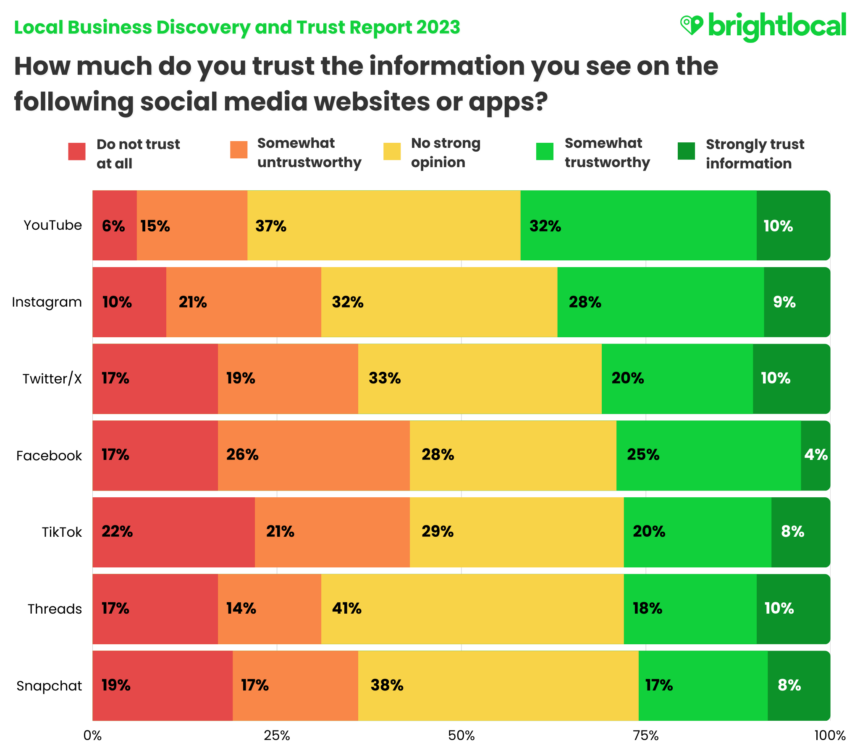
- Facebook and TikTok are the least trusted social media platforms, with 43% of consumers saying they either do not trust the information at all, or believe it to be somewhat untrustworthy, respectively.
- 42% of consumers believe that the information they see on YouTube is either somewhat or strongly trustworthy.
- Consumers are most ambivalent towards Threads, the newest competitor within the social media environment (at the time of publication)—41% of consumers have no strong opinions about the trustworthiness of the information on the app.
So, at the beginning of the survey, consumers highlighted Facebook as their fourth-most-trusted method of looking for business information online across all websites and platforms. And yet 43% do not believe the information they see on the social media website is entirely trustworthy.
It’s a little bit of a head-scratcher, but as we determined in the Local Consumer Review Survey earlier this year, consumers are generally more wary of misinformation and things like fake reviews today than they have been in previous years. With the sheer quantity of businesses managing Facebook pages, and some using them in place of a website entirely, it does make sense that it remains the most used.
Meanwhile, 42% of consumers believe that the information they see on YouTube is either somewhat or completely trustworthy. While that subject could probably fill many debates, it does show us that it’s a valuable channel for local businesses to consider—particularly considering how YouTube results are integrated into Google search—whether that’s in creating a YouTube channel yourself or considering options such as paid advertising, and influencer reviews.
TikTok is perceived to be untrustworthy by 43% of consumers, the same figure as for Facebook. Despite its reliance on video content, like YouTube, TikTok is known for controversial trends and users going viral, so it’s perhaps not so much in the minds of consumers when it comes to thinking about local businesses.
Our research did not survey US adults under the age of 18, but it is worth noting how Gen Z is using the social platform as a search engine more than Google, so it will be interesting to come back to this topic over time and see how consumer trust in business information on TikTok changes.
How often are consumers using social media for business discovery?
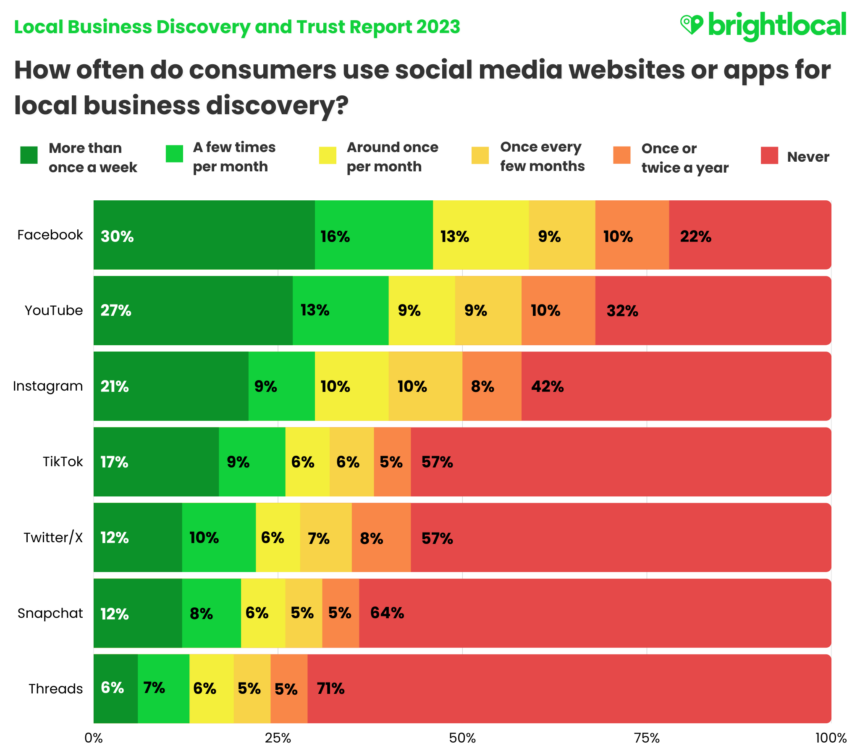
- 30% of consumers use Facebook to find local business information on at least a weekly basis.
- This is closely followed by YouTube, which 27% of consumers say they use to find local business information more than once a week.
Consumers can’t expect every local business to be a TikTok sensation, and even just keeping up with regular social posting can be tricky when you’re a small business. However, understanding how frequently consumers are looking at social media to find businesses shows us that it’s vital to ensure your business’s information is at least discoverable, correct, and consistent across these platforms.
The most obvious platforms that spring to mind for business information are Facebook, which is also considered a business citation site, and Instagram, which has refined the way it shows users business information via its maps functionality. But even TikTok and Snapchat, social platforms used largely by younger demographics, have map functionalities and business information built in, so you never know when user-generated content could even pop up featuring your local business!
Plus, while the Local Consumer Review Survey found that 20% of consumers were using TikTok for local business discovery as of January 2023, we can see here that 31% of consumers are now using it on at least a monthly basis. That’s a significant jump in less than a year.
The Importance of Photos for Business Discovery and Building Trust
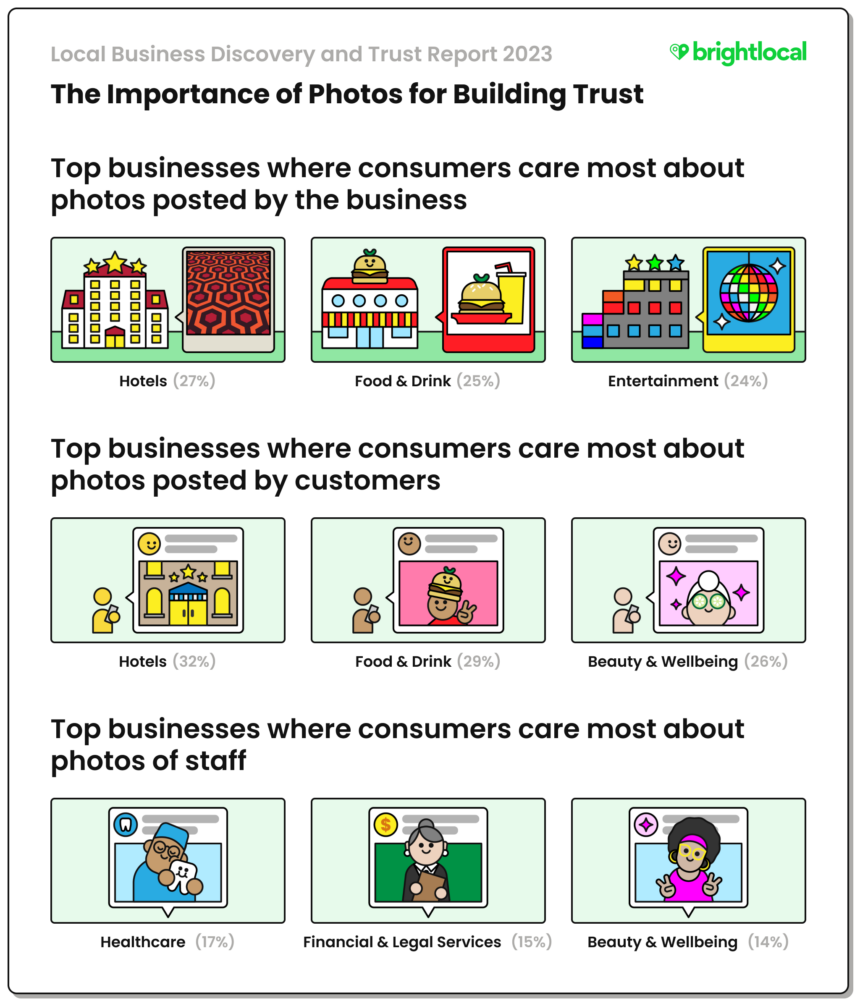
Of course, photos aren’t limited to social platforms. Consumers had long been posting photos to the likes of Tripadvisor before many of today’s platforms came into their own! But in today’s ‘always online’ world, the sheer diversity of visual content creates more choices than ever when it comes to researching and discovering businesses.
Not only do we see the glossy, marketing-quality photos that businesses want you to see across their websites and business listings, but we also get the everyday and behind-the-scenes content they share on social, not forgetting the spontaneous snaps from customers.
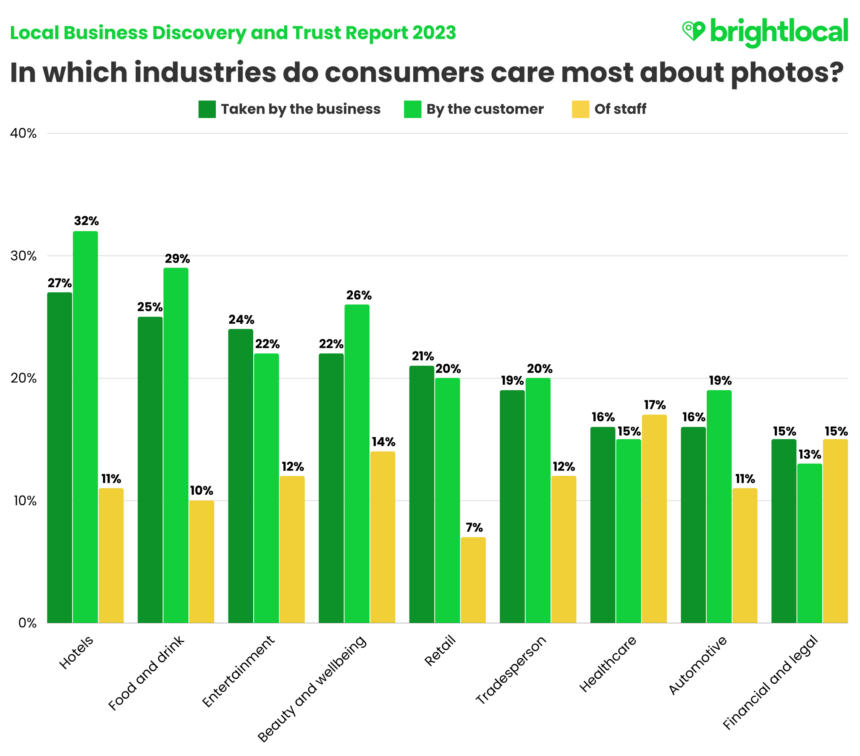
- The industries where business-supplied photos are seen as more important than customer photos are entertainment (24%), retail (21%), healthcare (16%), and financial and legal (15%).
- Consumers care most about customer photos in the hotel (32%), food and drink (29%), and beauty and wellbeing (26%) industries.
- Photos of staff and team members within the healthcare industry are seen as important by 17% of consumers.
For service- and experience-centered businesses, consumers want to see accurate reflections of exactly that: the experience. 32% of consumers rated ‘photos taken by customers’ as one of the most important factors affecting their decisions around hotels, followed by 29% for food and drink businesses, and 26% for the beauty and wellbeing industry.
Considering each of these industries can be known for glossy, staged, and over-saturated imagery, it’s not surprising that consumers are looking to each other’s experiences as evidence of what’s ‘real’.
Choosing a hotel is a particular investment of your trust because, for however many nights, a consumer is using this as an alternative to their home. For beauty and wellbeing experiences, a consumer places trust in its professionals, often related to very physical treatments, and therefore wants to be reassured by real customer results beforehand.
The top two industries where consumers rate business-provided photos as more important than those taken by customers were entertainment and retail. As we highlighted when discussing the importance of reflecting fundamental business information for industries such as retail, consumers are likely looking for similar here, including imagery of the business itself to confirm location. For entertainment businesses such as movie theaters or bowling alleys, this could be much more facility-led—namely, does the venue offer what the consumer wants?
Although photos of business team members seem to be lower down on the scale of important decision-making factors, there is a notable percentage of consumers choosing healthcare (17%) and financial and legal businesses (15%) based on the availability of staff photos.
For healthcare, which can involve very personal and sometimes invasive treatments, consumers want an idea of exactly who they will be trusting with their physical or mental health. In financial or legal environments, it’s the same sentiment: consumers are placing trust around sensitive topics in an individual as opposed to a brand, so it’s important that they’re able to see who they will be dealing with.
Essentially, these findings show that being able to display a breadth of photos across your business listings will ultimately provide potential customers with more information up-front to help them make a decision. As well as the high-quality marketing imagery, it’s important to show customers what’s real, so keep this in mind when adding photos to your listings.
Summary
It’s clear that the consequences of inaccurate business information can be vast, ranging from causing confusion and frustration to potentially damaging a business’s reputation or losing out on customers completely.
At the very least, local marketers and business owners should use the insights gathered in this report to get on top of their business listings and check the accuracy of information across various platforms, including social media.
Of course, it can be a big job to source everywhere your business is listed, and setting reminders to review and update information may not always ensure the work gets done—but there are easier ways to manage it! Check out the available services through BrightLocal’s Listings Management tools, which cover everything from building your citations to ensuring your business updates are pushed out to all relevant listings.
Methodology
A representative sample of 1,138 US-based consumers was used to conduct the Local Business Discovery and Trust Survey in September 2023. The survey was distributed to an independent consumer panel via SurveyMonkey, in which age group breakdowns and gender are balanced.
However, SurveyMonkey’s consumer panels only consider participants who identify as male or female and therefore do not consider where participants may identify outside of binary genders. Additionally, no consumers under the age of 18 participated in this survey.
Using Our Data
You are welcome to use the survey findings, charts, and data, provided BrightLocal is credited and linked to via this page’s URL. If you have any questions about this research, please contact the research team.
